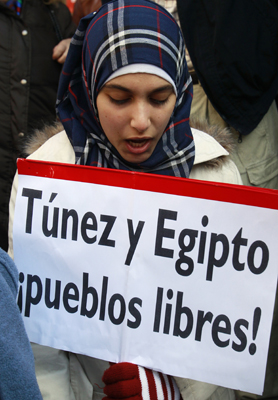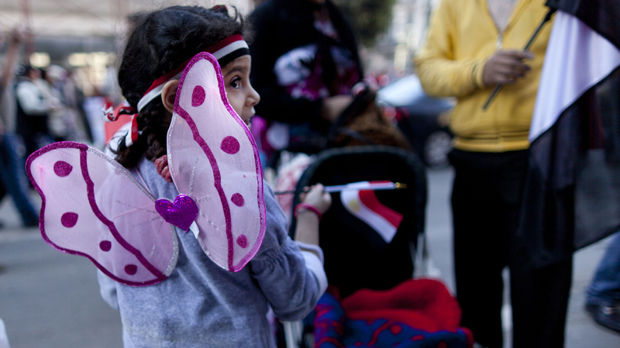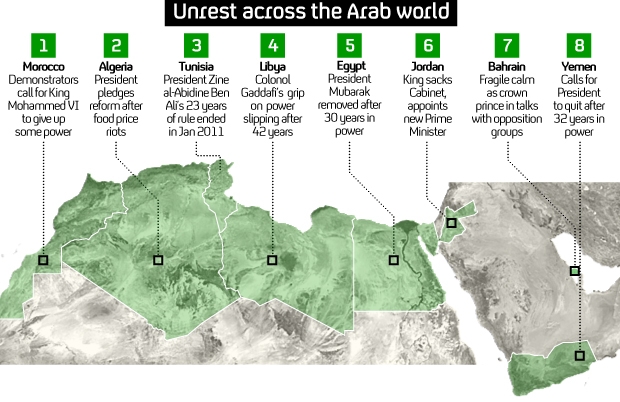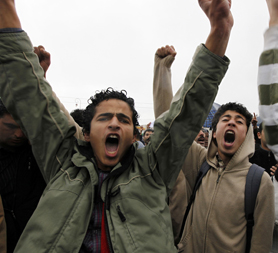Arab uprisings: what happens next in Egypt, Tunisia, Libya?
The scent of revolution has moved to Libya, but after people power brought down the leaders of Tunisia and Egypt, Channel 4 News asks two Middle East experts what is happening in those countries now.

It took 29 days to remove Ben Ali in Tunisia, 18 before Mubarak stood down in Egypt. Now the regime of Colonel Gaddafi, Libya‘s leader for nearly 42 years and a totemic figure in global politics, is being severely tested.
These previously unthinkable uprisings across the Arab world also encompass protests in Bahrain, Yemen, Algeria, Jordan and Morocco.
Channel 4 News special report – Arab revolt: Middle East uprisings
The revolutions of eastern Europe during 1989 saw sweeping change across communist states and redrew the political map forever. Are we seeing the same in these current uprisings?
Dr Claire Spencer is head of the Middle East and North Africa programme at Chatham House. She told Channel 4 News that in the current wave of unrest the “spark may be the same but in each country there is a different situation and the devil is in the detail”.
Dr Larbi Sadiki, a senior lecturer in Middle East politics at the University of Exeter, said: “It is too early to assess the final outcomes of the revolutions in Tunisia and Egypt.
“It will be at least another six to twelve months before we can begin to grasp whether the ousting of Ben Ali and Mubarak can be equated with a move towards people’s democracies in each of these Arab states.”
Tunisia: model for the region or moving too fast?
The popular uprising in the North African state in January 2011 ended President Zine al-Abidine Ben Ali’s 23 years of rule.
It has been held up as the catalyst for protests across the Middle East, with US Senator John MCCain praising a “model revolution”. The country’s former leader Rachid Ghannouchi, who lived in exile in the UK for 20 years, told Channel 4 News: “I always believed that this [revolution] was the only solution because reform was impossible under the regime.”
But after the scenes of jubilation in Tunis at the end of January, has “reform” begun to take shape?
Elections to replace Ben Ali are scheduled for July or August, but new protests have erupted in recent days against the interim government tasked with organising the summer vote. This group already faces criticism for failing to address rising crime rates and poverty.
Dr Claire Spencer, from Chatham House, told Channel 4 News that Tunisia is hampered by ministers still in power who served in the previous administration. But she added that the fresh protests “show there’s a civilian ethos” and that Tunisia’s general unions “clearly feel free to speak”.
The process of rewriting Tunisia’s constitution is now taking place and Dr Spencer said it would be a delicate “readjustment of winners and losers”.
In Tunisia, there are risks because everything is happening so fast. Ahmet Davutoglu, Turkish foreign minister
Three committees are in place to address political reform, corruption, and transitional justice, Dr Larbi Sadiki told Channel 4 News.
But he cautioned: “Whilst a step in the right direction, those I met in Tunisia have expressed doubts on the following grounds: the non-representative nature of the committees whose members are hand-picked to be ‘safe’; heading the second and third committees are individuals whose neutral bona fides are questioned for links with the Ben Ali regime; and the fact that for some critics these committees should be answerable to an elected parliament, which is at least unattainable until 2012.”
Speaking to the New York Times, lawyer Yadh Ben Achour, who is leading a commission on political reform in Tunisia said: “We might lose our freedom, because we become too drunk on freedom.”
Turkish Foreign Minister Ahmet Davutoglu said Tunisia has a chance to provide a positive model for other countries seeking reform, if it can avoid pitfalls on the path to elections. He added: “In Tunisia, there are risks because everything is happening so fast.”

(A girl with butterfly wings at a celebration in Tahrir Square, Cairo – Getty)
Egypt: a new era or ‘cosmetic change’?
The scenes of jubilation among the crowds in Tahrir Square after the ousting of President Mubarak were reminiscent of those famous images as the Berlin Wall was dismantled in 1989.
When Mubarak finally fell after days of resistance, and 30 years in power, key opposition figure and Nobel Peace laureate Mohamed ElBaradei said: “This is the greatest day of my life. The country has been liberated”. But now what?
The elitist nature of Egyptian politics excludes new forces who have gained legitimacy through the mass protests. Dr Larbi Sadiki
The glow of revolution may already be fading for Mr ElBaradei. Via Twitter (@ElBaradei), he posted a message on Monday (21 Feb) which read: “Cosmetic change in government of fallen regime is insult 2 revolution & same old contempt of peoples’ will. We still have a long way to go.”
Dr Sadiki, of Exeter University, told Channel 4 News: “The question revolves around whether to amend the existing constitution or create a new one”.
He explained: “The elitist nature of Egyptian politics, which is also true of Tunisia, excludes new forces who have gained legitimacy for inclusiveness through the mass protests that ousted Mubarak in February.
Nobody in the Middle East is in the mood to be told how to live their lives. Dr Claire Spencer
“There are even claims (in both countries) that the youth are not represented sufficiently in the ongoing negotiations and committees, with most of the key tasks assigned to the old political cast.”
Dr Claire Spencer agrees, asking: “Where is the younger generation’s voice?” She added that while Mr ElBaradei has been a good transition figure, and remains a “weather vane for how legitimate the process is” he is from the “wrong generation” and a genuine shift forward away from a “paternalistic system” is now needed.
She also told Channel 4 News there remains a significant question mark over the interests of Egypt’s senior military figures.
“They have the chance to rise to the occasion. The military have until now been protected by the Mubarak system but we shall now see to what extent they are prepared to accept a genuinely pluralistic economy,” she said.
What if Israel’s own citizens stage their own revolution in favour of peace? This may be only a dream. But no-one two months ago thought Ben Ali and Mubarak would be out by early 2011. Dr Larbi Sadiki
In terms of the international community Dr Spencer said it is vital the west, particularly the US, is prepared to work with the Muslim Brotherhood, if they are part of a coalition, and help a pluralistic system evolve.
“Nobody in the Middle East is in the mood to be told how to live their lives,” she said.
Iran sends ships through Suez canal
After an agreement with Egypt Iran has sent two naval ships through the Suez canal for the first time since the Islamic revolution of 1979, causing great concern to Israel. Iranian officials have confirmed the ships are heading to Syria, but for training purposes.
It could be the first of several nerve-jangling moments in the region as the true impact of the new political map unfolds. Dr Sadiki said Israel is “no doubt shaken and surprised by the cascading changes”.
He added: “What if Israel’s own citizens stage their own revolution in favour of peace? This may be only a dream. But no-one two months ago thought Ben Ali and Mubarak would be out by early 2011.”

Libya, Bahrain, Jordan, Yemen, Algeria and Morocco
In Libya Muammar Gaddafi has appeared on state TV to deny rumours he has fled the country following demonstrations and reports of airforce bomb attacks on protesters. The Arab League is holding an emergency meeting in Cairo for delegates to discuss the Libyan crisis.
There is relative calm in Bahrain although large crowds continue to gather in Pearl Square. King Hamad bin Isa Al Khalifa has asked his son, the crown prince, to conduct talks with all parties, but after bloodshed on the streets, the mood remains tense.
In Jordan, King Abdullah swore in a new government earlier this month, led by a former general who promised to widen public freedoms in response to anti-government protests. A mix of tribal and Islamist-led opposition has called for moves towards a constitutional monarchy that limits the powers of the throne.

Anti-government protests continue in Yemen as calls for President Ali Abdullah Saleh, in power for 32 years, grow louder. Saleh, 68, has pledged to quit in 2013 and not to hand power his son. He has also promised to reform parliamentary election laws.
Following protests in Algeria, and rioting over the cost of food, President Abdelaziz Bouteflika has promised more democratic freedoms, cuts in food prices, and ordered new job-creation measures. On Tuesday Algeria lifted a state of emergency, in force for 19 years.
And in Morocco, where the big issues are jobs and education, Dr Claire Spencer told Channel 4 News authorities have so far handled the protests “intelligently” with “almost non-existent policing”. Demonstrators are calling for King Mohammed VI to give up some of his power, but they have yet to call for his outright exit. It is reported on Tuesday that the bodies of five people have been found at a bank set on fire by protesters.